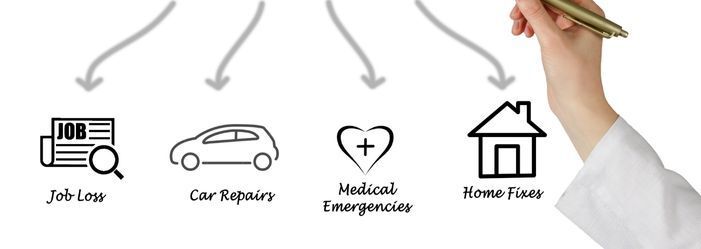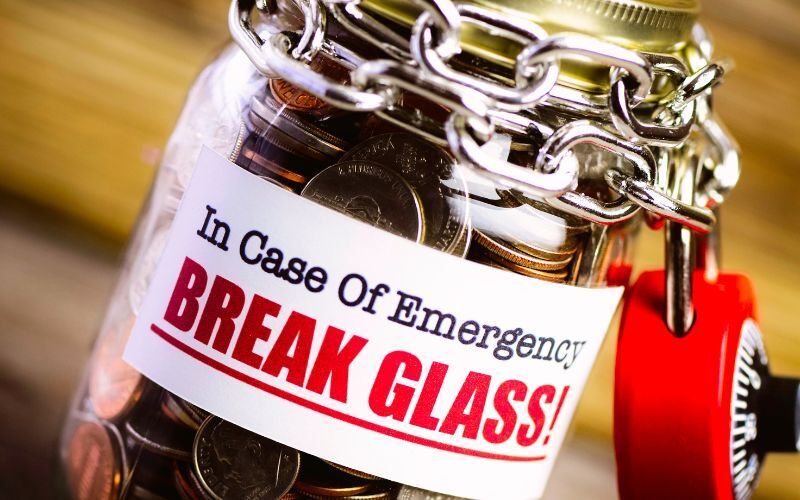Last Updated: July 18, 2024
Paying off your debt versus an emergency savings account

Disclaimer: We are not qualified legal or tax professionals and are not giving advice. Always speak with a qualified professional before making any legal or financial decisions.
In uncertain financial times, many struggle with whether to build an emergency fund or pay off debt. Both options are crucial: emergency funds provide a safety net, while debt repayment leads to financial freedom. But what if you could balance both?
This article explores strategies to manage an emergency fund while tackling debt. We'll dive into how to allocate resources effectively, considering factors like interest rates and personal circumstances. By understanding this balance, you can work towards both immediate stability and long-term financial health.
Join us as we unpack this common dilemma, offering insights to help you make informed decisions that align with your financial goals and pave the way for a more secure future.
If you'd rather speak to a debt specialist now, click here for a
free consultation.
What is an Emergency Fund?
Financial experts often recommend building an emergency fund as a key strategy to avoid debt. But what if you're already facing debt? The question of whether to focus on an emergency fund or pay off debt is common. If you're unsure where to start, our article on emergency funds can guide you.
An emergency fund serves multiple purposes: it can cover living expenses if you lose your job, handle minor medical emergencies, or even replace a broken water heater. While many experts suggest saving three to six months of living expenses, this goal can seem daunting. Instead, aim for an initial $1,000 and replenish it whenever you use it for unexpected costs. If $1,000 feels out of reach, break it down further. Whether you can save $85 or just $5 a month, every bit helps build your financial resilience. The key is to start somewhere.
To effectively manage your emergency fund or pay off debt, consider opening a separate savings account for unexpected expenses. Create a budget that allows you to set aside regular payments into this fund.
Without an emergency fund, people often turn to risky options like car title or payday loans. These short-term, high-interest debts can charge up to 400% interest and should be avoided at all costs. They can quickly derail your efforts to build savings or pay off existing debt.
If you need more information on emergency savings, budgeting, and cutting expenses, click here.
How Much Should Your Emergency Fund Be?
Financial experts often recommend saving 3 to 6 months' worth of living expenses in your emergency fund.
To estimate how much you need:
- Make a list of all your necessary monthly expenses like rent, groceries, utilities, etc.
- Tally up the total for one month.
- Multiply this number by 3-6 to get your target emergency fund size.
So if your monthly expenses are $2,000, your target would be $6,000-$12,000 saved.
Consider if you need more or less based on your situation:
- Less if you have other assets or income sources.
- More if your income fluctuates a lot or you are the sole provider for dependents.
Paying Off Credit Card Debt
Credit card debt compounds quickly, adding interest on interest. When balancing an emergency fund or paying off debt, consider the high cost of carrying credit card balances. This compounding effect can significantly increase your overall debt, making it crucial to strategize your debt repayment while maintaining some emergency savings.
Minimum monthly debt payments on credit cards make credit card companies a lot of money and cost you a lot of money. Our debt payoff calculator tool can help you with the numbers and different payoff scenarios.
Paying down debt can improve your credit score. Carrying a lot of credit card debt and missing payments immediately harms your credit rating. Discover more strategies with our guide on the best ways to pay off your credit cards.
Where Should You Keep Your Emergency Fund?

When deciding whether to build an emergency fund or pay off debt, consider using a high-yield savings account. These accounts offer better interest rates than traditional savings, helping your money grow faster while remaining accessible. Look for an APY of at least 1% and check withdrawal limits. This approach allows you to build your emergency fund effectively, even as you work on debt repayment, ensuring you're prepared for unexpected expenses.
Understand your credit score and what it means
We've mentioned credit scores several times, so let's look at your credit score more closely. This is going to be a quick look. Check out our debt relief blog for more in-depth information on your credit score by clicking here.
Five factors go into your credit score. In order of importance, these are:
1) Payment History (35%)
Basically, this means you pay your bills on time, every time. Lenders want to know that you are a good risk to lend money to and paying your bills on time is very important.
2) Credit Utilization Ratio (30%)
When balancing an emergency fund and debt repayment, consider your credit utilization ratio (CUR). This compares your debt to available credit. Aim for a CUR below 30%. Calculate it as:
(Debt ÷ Credit limit) x 100 = CUR%
Lowering CUR by paying off debt can boost your credit score and overall financial health.
3) Age of Credit (15%)
Lenders like to see a long credit history. The only way to increase this factor is through time passing.
4) Credit Mix (10%)
This involves having different kinds of credit on your credit report. This can include mortgage or student loans and auto loans along with credit cards. If you rent, you can add that history to your credit report so that you have more data.
Read more about Different Kinds of Debt
5) Recent Applications (10%)
Be cautious with new credit applications. Hard inquiries from these can lower your credit score. When balancing an emergency fund or paying off debt, remember that multiple applications suggest increased debt risk. Avoid opening new accounts just to boost available credit. Focus instead on managing existing debts and building savings.
Some Other Factors
Some of the credit reporting bureaus use additional information like your profession and salary. The big three credit bureaus (Transunion, Experian, and Equifax) will have slightly different scores based on the difference in which creditor reports to whom and if they use additional factors.
Should you use your credit cards for all purchases?
There are some popular reasons to use your card as long as you pay off your balance.
Here are some:
- Building Your Credit
- Security - with a credit card, you do not need to carry a lot of cash
- Convenience - see above! You'll need a card for the airline, hotel, or rental car reservations
- Travel - credit cards are easier to carry than cash, and you can get it replaced if it gets stolen
- Consumer Protection - many credit cards offer warranties, price protection, travel protection, additional rental car insurance, or other protections on purchased items. Check your card to see what protections you are offered
- Rewards and Cash-back - if you can use the rewards, this is a good reason to use a card (but pay it off every month)
- Grace Period - the time between the charge on a card and when it starts to accrue interest. If you can pay off your card immediately and take advantage of the grace period, it makes sense to use the card.
- Online Shopping - Obviously, shopping online and using cash is very difficult. Consider a debit card with a daily spending limit set at your financial institution instead of a credit card.
How Credit Card Interest Rates Can Hurt You
Credit cards typically have high interest rates. When balancing an emergency fund or paying off debt, it's crucial to understand how quickly credit card balances can grow if carried month-to-month. Let's examine this impact on your overall financial health.
Monthly Payments
Let's say you have a balance of $6,000 and you make the minimum payments, of roughly $120 a month. Understanding debt solutions and monthly payments can help you make informed decisions about managing your debt. It will take you 8 years to pay off the debt, and the high interest means you will pay $11,352 total.
- Credit card balance: $6,000
- Current rate: 18.24%
- Payment: $120
- Time to debt free: 95 months (almost 8 years)
- Interest paid: $5,352
- Total paid: $11,352
Not running up your credit cards is very important. Paying them down is equally important. If you're on a tight budget, you might be wondering how to pay off credit card debt effectively. Let's take the same situation but consider doubling the payments.
Double the Monthly Payments
As you can see in this example, you decrease the amount of time to pay off your debt and the total paid. If you can, it is worth paying extra each month.
- Credit card balance: $6,000
- Current rate: 18.24%
- Doubled payment: $240
- Time to pay off: 32 months (almost 3 years)
- Interest Paid $1,605
- Total paid: $7,605
Putting It Together
Deciding on which to do first, emergency fund or pay off debt, often leads to the question of emergency fund vs paying off debt: which strategy is more beneficial for your financial health? While some might suggest that paying off debt is the most important, an emergency fund can keep you from going deeper into debt. It's not necessarily a choice of one over the other; ideally, you should aim to balance both.
Budgeting
Your first step is to set up a budget. You may have to make sacrifices to build an emergency fund and pay off debt. For more guidance, check out these tips on how to pay off debts and achieve financial freedom. These short-term sacrifices will be worth the effort.
Keep an eye on your spending habits with your budget.
Set Up a Savings Account
When deciding whether to prioritize an emergency fund or pay off debt, start with a separate savings account. Aim for $1,000 initially, adding funds gradually. Split windfalls between your emergency fund and debt payments. As savings grow, consider high-yield accounts for better returns. This balanced approach helps build financial security while tackling debt, ensuring you're prepared for unexpected expenses.
Control Your Credit Card Usage
Put away your credit cards and follow the following rules:
- Use a card for emergencies only and then pay it off from your emergency account
- Pay off your balance in full every month
- Avoid using your card for luxury items that you can't afford
Pay Off Debt
While building your emergency fund, you can also start to pay off debt. We'll explore different strategies to balance these priorities. Whether you focus more on your emergency fund or debt repayment, avoid new debt to maintain financial stability.
Divide any extra income between your emergency fund and your debts.
The Best Ways to Pay Off Debt
Balancing an emergency fund and paying off debt often requires careful budgeting. While keeping essential payments current, focus on aggressive debt repayment. This may involve sacrifices, but it's crucial for financial stability. Whether you prioritize your emergency fund or pay off debt first, maintain a strategic repayment plan to tackle multiple debt sources effectively.
Let's take a look at each different debt repayment method.
The Avalanche Method
The avalanche method can help balance emergency fund goals and debt repayment. Focus on the highest interest rate debt first, then move to the next. This approach may save on interest over time. Choose between this and the snowball method based on what motivates you most in your journey to financial stability.
The Snowball Method
When balancing an emergency fund or paying off debt, consider the Snowball method. Focus on the smallest debt first, making minimum payments on others. As each debt is cleared, roll that payment into the next smallest. This approach provides quick wins, motivating you to prioritize savings or debt repayment.
Balance transfer credit card
Balance transfer cards offer low or 0% APR for high-interest debt. When choosing between an emergency fund or paying off debt, this can be useful if you can clear the balance during the promotional period. Be cautious of high rates after this time ends.
Debt consolidation loan
A debt consolidation loan is an unsecured personal loan or a home equity loan that you take out to pay off the cards. You then focus on paying off the loan until you are debt-free.
Debt consolidation loans can be effective if you qualify for lower interest rates. When choosing between an emergency fund or paying off debt, this method can reduce monthly payments. However, a good credit score is crucial for securing favorable terms. Consider this option to simplify your debt while maintaining some savings.
Could a Debt Consolidation Loan Help?
Consider debt consolidation loans to tackle high-interest debts by combining them into one lower-interest payment. This approach, when deciding between building an emergency fund or paying off debt, may lower monthly costs and reduce overall interest. It could potentially free up money for both goals. However, ensure your credit score qualifies you for favorable terms, and be cautious of variable rates. Choose a strategy that supports your financial stability and long-term objectives.
Debt Settlement
Debt settlement, often conducted through professional companies, can be a last resort before bankruptcy. This method involves stopping payments on unsecured debts while building savings. When choosing between an emergency fund or paying off debt, debt settlement can be a drastic option. The company negotiates with creditors to reduce your obligations. However, be aware of two major drawbacks: potential credit score damage and possible tax implications, as settled debt may be viewed as income by the IRS. Consider this option carefully in the context of your overall financial strategy.
FAQs
Conclusion
When deciding whether to build an emergency fund or pay off debt, remember there's no one-size-fits-all solution. Consider these key points:
- Consult nonprofit credit counseling for personalized advice and budgeting help.
- Balance building an emergency fund with managing existing debts.
- Once debts are under control, explore retirement savings options.
- For overwhelming debt, consider debt management plans, debt settlement, or bankruptcy as a last resort.
Ultimately, the right strategy depends on your unique financial situation. Whether you prioritize your emergency fund or debt repayment, the goal is long-term financial stability. If you're struggling to find balance, don't hesitate to seek professional guidance.
We offer a no-obligation
FREE consultation to help you understand all your options
*Disclaimer: Pacific Debt Relief explicitly states that it is not a credit repair organization, and its program does not aim to improve individuals' credit scores. The information provided here is intended solely for educational purposes, aiding consumers in making informed decisions regarding credit and debt matters. The content does not constitute legal or financial advice. Pacific Debt Relief strongly advises individuals to seek the counsel of qualified professionals before undertaking any legal or financial actions.
Reduce Your Credit Card Debt By Up to Half

BBB Reviews | 4.9/5.0 Rating









 Do Not Sell My Personal Information
Do Not Sell My Personal Information